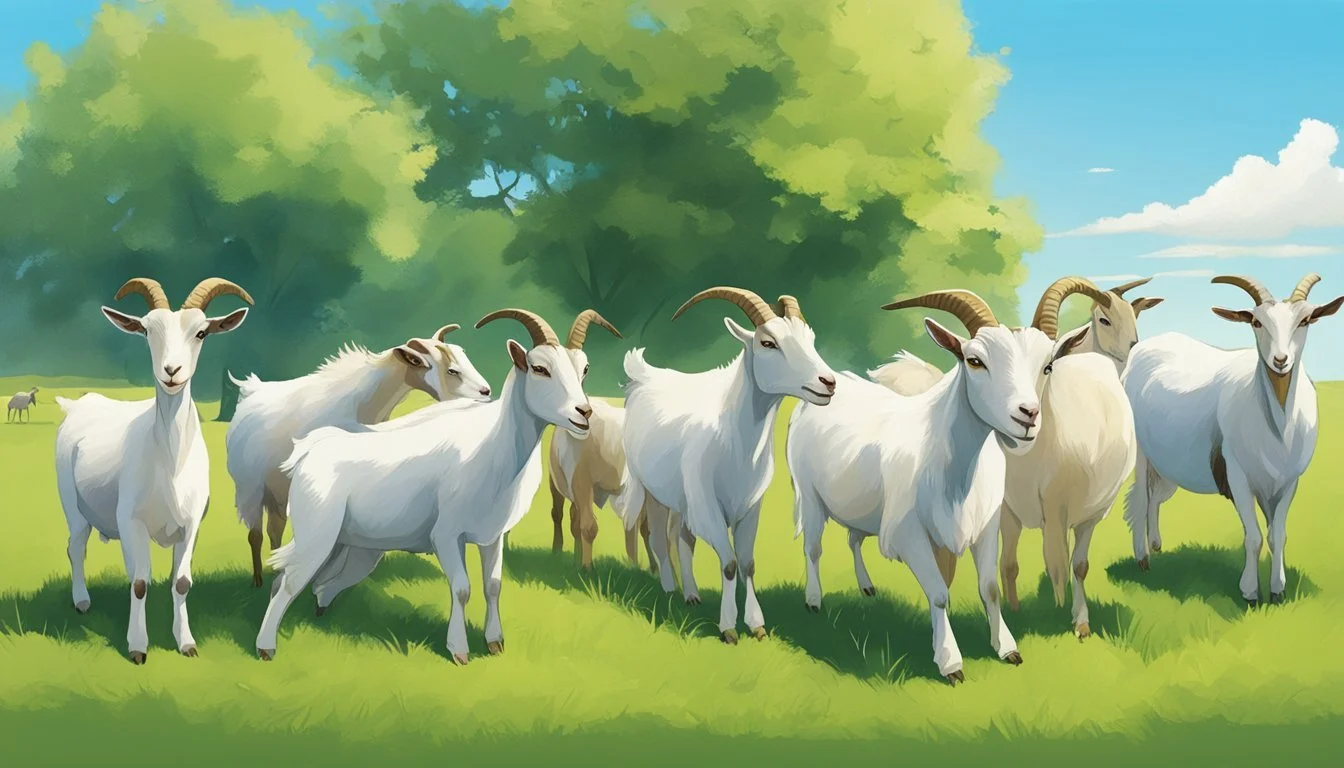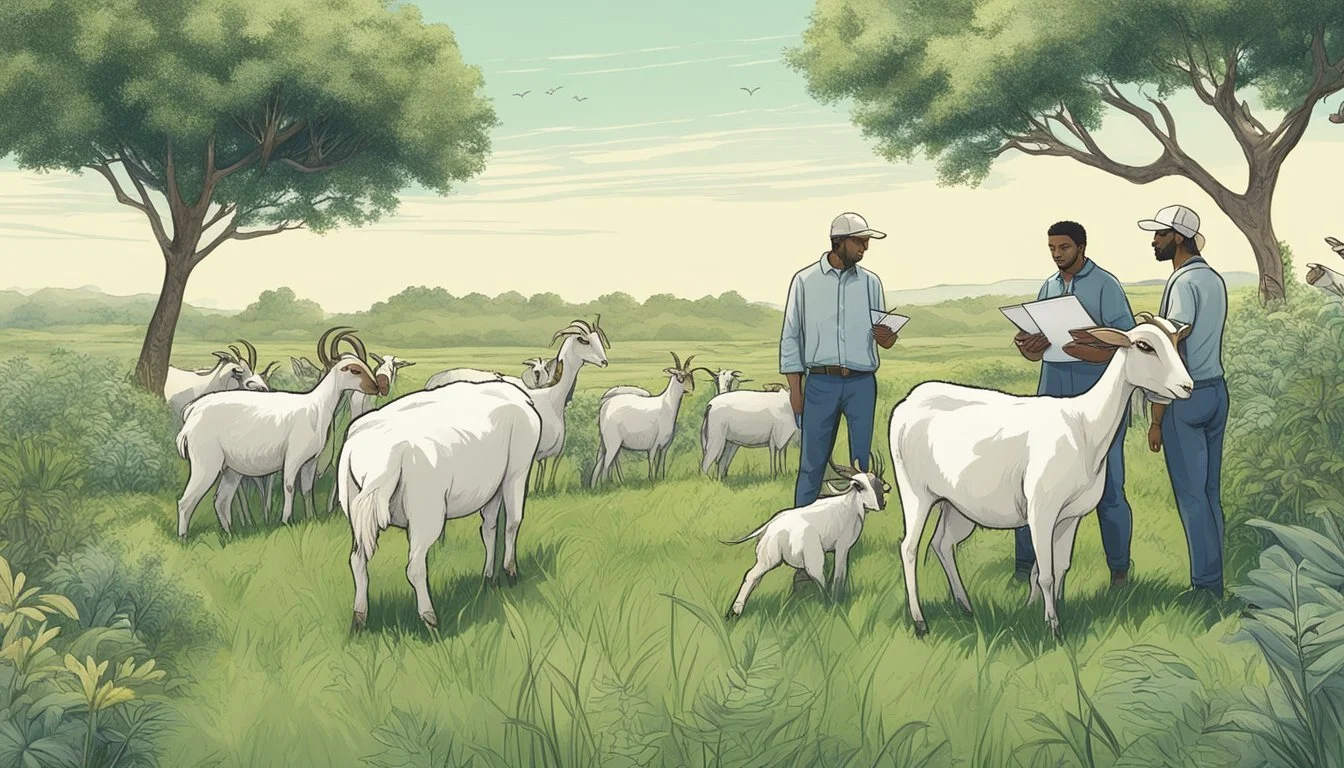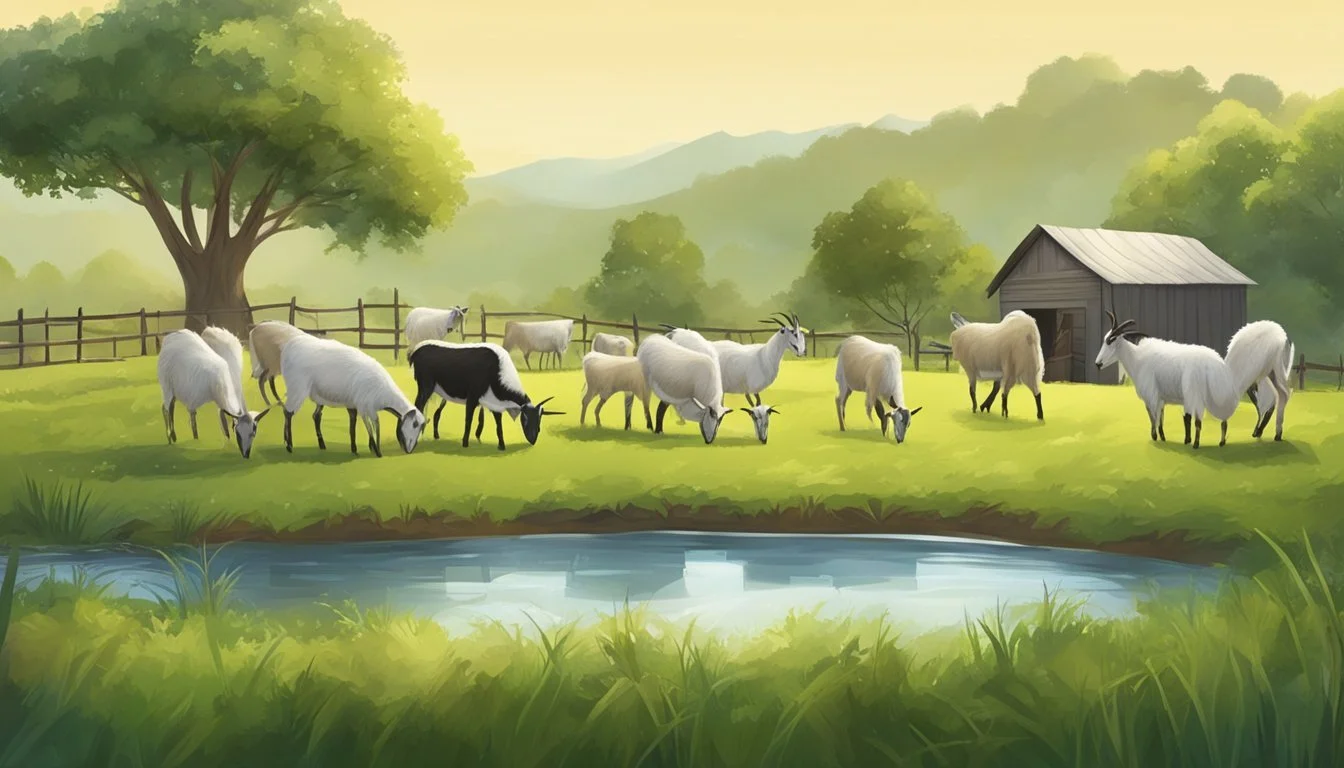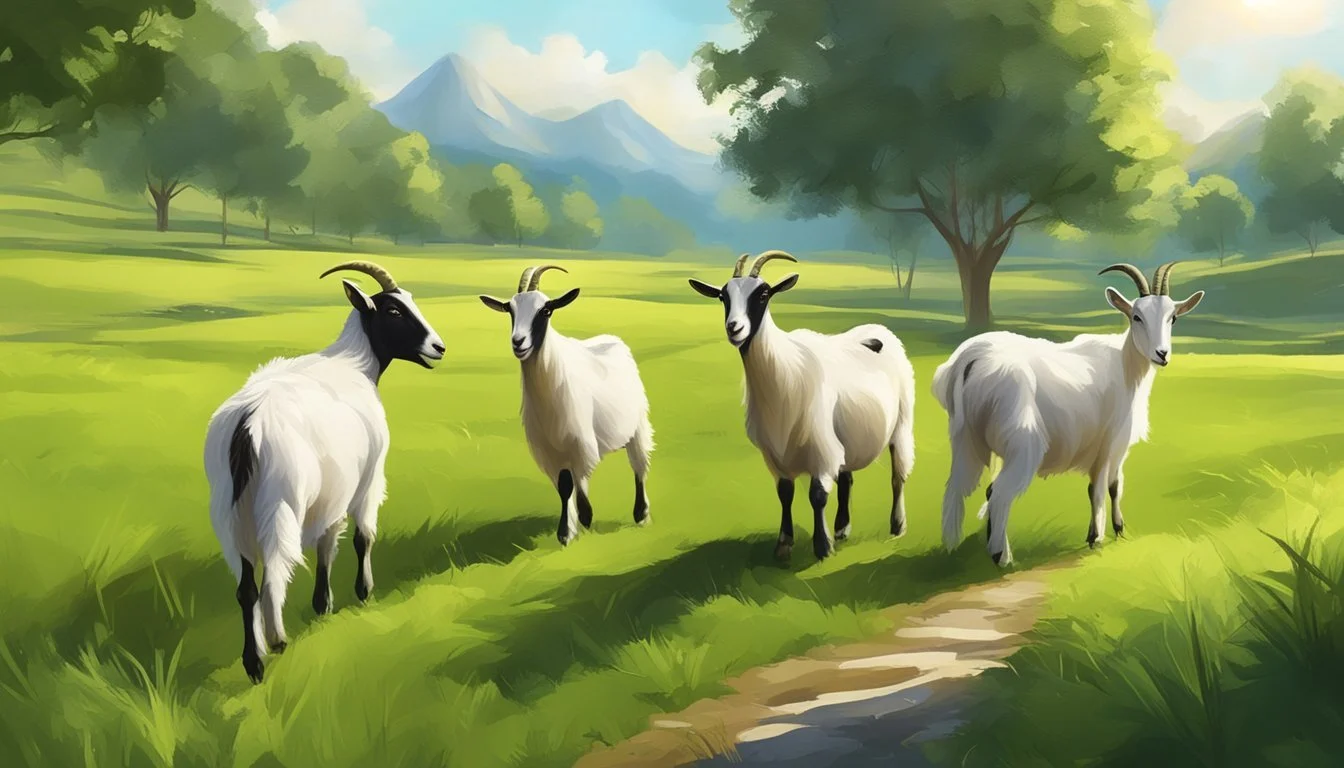What are the Nutritional Needs of Goats?
Understanding Their Dietary Essentials
Understanding the nutritional needs of goats is crucial for their health and productivity, whether they're kept for dairy, meat, fiber, or as pets. Goats are unique ruminants with dietary requirements that differ from other livestock such as cattle or sheep. They have evolved as browsers, preferring to eat a variety of leaves, twigs, vines, and shrubs. This natural inclination towards variety is key to meeting their complex nutritional needs, which include carbohydrates, proteins, fats, vitamins, minerals, and water.
The diet of a goat should be balanced and provide all the necessary nutrients to prevent deficiencies and promote optimal health. Adequate levels of calcium and phosphorus are particularly important to maintain a healthy balance, as well as other minerals like magnesium, potassium, and salt. These minerals are often met by providing access to pasture and browsing materials, supplemented with mineral blocks or loose minerals to ensure they receive a complete profile of nutrients.
Additionally, the dietary needs of goats change throughout their life stages and in different physiological states. For instance, lactating does have higher nutritional demands, especially for protein and energy, to support milk production. On the other hand, maintenance requirements for adult goats not in production can be met with good quality forage. By providing a diet that caters to their specific needs, goats can maintain good health and productivity throughout their lives.
Understanding Goat Physiology
Goat physiology is uniquely adapted to their dietary habits, which directly affects their health and nutritional demands. Their digestive system and stage of production play critical roles in determining the specific nutritional needs for energy, protein, and other key nutrients.
Digestive System
Goats possess a specialized stomach with four compartments, with the rumen being the largest. The rumen is a fermentation vat where microbial digestion of fiber occurs, allowing goats to extract energy and nutrients from forage that many other animals cannot. This efficient digestive system requires a diet high in fiber to maintain rumen health and function. Quality forage is therefore essential in a goat's diet to provide the necessary fiber needed for proper ruminal action, which in turn supports their overall health and well-being.
Stages of Production and Nutritional Impact
The nutritional needs of goats change significantly during the various stages of production including growth, reproduction, lactation, and kidding. During growth, young goats need a diet rich in protein for development. In the reproduction phase, nutrients must support not only the maintenance of the adult goat but also the growth and health of the developing offspring. Lactation demands high levels of energy and protein to maintain milk production. After kidding, the mother requires additional nutrients to recover and to support the new kid, which is reliant on her milk. Each stage of production increases the demand for specific nutrients, underscoring the importance of a well-managed feeding program tailored to these physiological changes.
Fundamentals of a Balanced Diet
Understanding the nutritional needs of goats is critical to ensure their well-being and optimize their production, whether for meat, dairy, or fiber. Proper nutrition entails providing a diet that satisfies the goat's energy requirements, protein requirements, and other nutritional needs through a precise balance of carbohydrates, fats, proteins, vitamins, and minerals.
Essential Nutrients
Goats require a variety of essential nutrients that are necessary for maintaining health and supporting productive functions. These nutrients include:
Water: The most critical nutrient, it is vital for maintaining physiological processes.
Proteins: Necessary for growth, milk production, and repair of body tissues.
Carbohydrates: The primary source of energy for goats.
Fats: A concentrated source of energy, important for maintaining body condition.
Vitamins: Required in small quantities, but essential for various body functions.
Minerals and Trace Minerals: Including calcium, phosphorus, magnesium, and others for bone development, enzyme function, and overall health.
Nutrient Requirements
The nutrient requirements of goats vary based on age, weight, growth rate, reproductive status, and production type. These requirements can be categorized as follows:
Energy Intake: Needs to match the output for activities, growth, lactation, or gestation.
Protein Requirements: Higher in lactating does and growing kids.
Vitamins and Minerals: Requirements for vitamins like A, D, E and key minerals such as selenium and zinc are critical for preventing deficiencies and ensuring optimal health.
Water Consumption: Can vary, but goats need continuous access to clean water to regulate body temperature and support milk production.
By focusing on these fundamental aspects of a balanced diet, one can provide the right feeding regimen to cover the wide range of nutritional requirements goats have. Whether formulating their own diet or choosing a commercial feed, goat owners must prioritize proper nutrition to promote the health and productivity of their herd.
Forage and Feed Management
When managing the diet of goats, the focus is on selecting the right types of forage and implementing effective feeding and pasture management practices to meet the animals' nutritional requirements.
Types of Forage
Goats require a variety of forages to meet their dietary needs. Grass hay is a staple in goat nutrition, providing necessary fiber. Silage and haylage offer higher moisture content but require careful management to prevent spoilage. Browse, which includes shrubs and woody plants, is particularly favored by goats for its nutrient content and digestibility.
Legumes: Offer high protein content; examples include clover and alfalfa.
Grasses: Generally lower in protein but excellent for roughage; common types are timothy and Bermuda grass.
Browse: Comprises shrubs and brush; goats naturally forage on these and they are an excellent source of nutrients.
Feeding Practices
The feed intake for goats should be monitored to ensure they receive balanced nutrition. Concentrate feeds, like grains, are used to supplement forage, particularly for goats with higher nutritional demands such as lactating does. Mineral supplements are also essential, as forages alone may not supply all the necessary nutrients.
Feeding Schedule: Goats should have continuous or frequent access to forage, with supplemental feeds given at regular intervals.
Adjusting Diet: Feed and supplements need adjustment according to life stage, health status, and production requirements of the goat.
Pasture Management
Effective pasture management is vital for providing high-quality forage and maintaining sustainable grazing practices. Forage quality directly impacts the health and growth of goats, so regular pasture rotation is recommended to allow for regrowth and prevent overgrazing.
Rotational Grazing: Implementing systems for moving goats to fresh pastures to maintain forage quality and availability.
Pasture Composition: Seeding pastures with a mix of grasses and legumes can enhance the nutritional value of the grazed forage.
Supplementation and Minerals
Goat nutrition is a critical aspect of their overall health, and a balanced intake of essential minerals and vitamins is crucial for their well-being. Ensuring that goats receive the proper supplementation is necessary to compensate for deficits in their natural diet, especially when the mineral content of forages is not sufficient.
Mineral Supplementation
Supplemental minerals play a significant role in maintaining the health of goats. The primary minerals required include calcium, phosphorus, magnesium, sodium (salt), and potassium, along with trace minerals like copper, selenium, zinc, and molybdenum. An imbalance in calcium and phosphorus can lead to urinary calculi in goats, therefore the calcium to phosphorus ratio should be maintained between 1:1 and 2:1 to prevent this condition.
Calcium & Phosphorus: Supplementation with limestone or dicalcium phosphate can correct deficiencies.
Copper & Selenium: These trace minerals are vital but can cause toxicity if over-supplemented.
Salt (Sodium chloride): Goats require salt in their diet, and it is usually provided as free-choice loose salt or within a mineral mix.
Mineral supplements are commonly provided free-choice in a loose mix form to allow goats to consume according to their needs. A fully balanced, loose, free-choice goat mineral is important as block forms may not supply adequate quantities of minerals.
Vitamins and Other Supplements
While goats synthesize some vitamins naturally, supplements may sometimes be necessary to fulfill their dietary needs. Vitamins A, D, and E are particularly important and may need to be supplemented, especially in goats with limited access to sunlight or high-quality forage.
Vitamin A: Necessary for functions such as vision and immune response.
Vitamin D: Essential for calcium absorption and bone growth.
Vitamin E: Acts as an antioxidant and is also important for muscle and nerve function.
When considering overall diet composition, goats should have a diet with adequate dietary crude protein and meet their energy needs. These requirements increase in states of reproduction and lactation. Supplementation with commercially available feeds is common to ensure these needs are met, as forages alone may not provide sufficient nutrients.
Note on supplementation tracking: Over- or under-supplementation can lead to health issues in goats. It's important for goat producers to keep a keen eye on the condition of their goats and adjust supplementation as necessary.
Health and Condition Monitoring
Maintaining the health of goats is contingent on vigilant monitoring and proactive management practices. Close observation of physical condition and behavior provides vital insights into their nutritional state and overall well-being.
Body Condition Scoring
Body condition scoring (BCS) serves as a critical tool for assessing the health and nutritional status of goats. Scored on a scale from 1 to 5—with 1 indicating an extremely thin goat and 5 signifying an extremely obese individual—this system evaluates the fat covering over key areas such as the loin, brisket, inner thigh, and ribs. A standardized body condition score should be utilized to make informed decisions regarding a goat's diet and management of its long-term dietary needs.
Regular BCS assessments help identify the first signs of health issues, such as diseases or internal parasite infestations, which can compromise a goat's immune system and impact hair production, feces consistency, and other physiological processes. A goat in prime condition will have a moderate amount of fat covering, corresponding to a BCS of about 2.5 to 3.5, indicating adequate nutrition and a good health status.
Monitoring for changes in body condition, in addition to tracking changes in feces, urine, and hair condition, can provide early warnings of potential health problems. Incidences of diarrhea, for instance, may point to gastrointestinal parasites, while changes in urine may signal dehydration or urinary diseases—affecting the overall health of goats. Insightful management and regular scoring allow for timely interventions to ensure the goats' immune system remains robust and the animals stay in prime health.
Special Considerations
When managing the nutrition of goats, it is crucial to consider both the necessary dietary components for health and the risks of certain feed elements that can cause toxicity.
Dietary Concerns and Toxicities
Goats require a well-balanced diet that must address specific nutritional needs without exposing them to harmful substances. Unlike sheep, goats are more curious and will often sample a variety of plants, which can lead to unintentional ingestion of toxic materials. For instance, the management of copper levels is particularly important in goat nutrition due to the risk of copper toxicity. Goats typically require more copper than sheep, but excessive amounts can lead to serious health issues, especially in buck goats.
Certain plants can also be toxic to goats. They may tolerate a small amount of poison ivy; however, other plants commonly found in pastures might be harmful if consumed. It is essential to ensure that areas where goats graze are free from toxic plants and that supplemental feeds are free from contaminants that could cause toxicity.
Special dietary considerations must be made for dairy goats and meat goats due to their differing nutritional requirements. Dairy goats, in particular, require a diet that supports milk production and maintains their overall health during lactation. On the other hand, meat goats benefit from a nutrition plan focused on growth and muscle development. In all cases, a careful balance of vitamins, minerals, proteins, and energy is vital for the optimal health and productivity of these animals.
Environmental Factors Affecting Nutrition
The nutritional needs of goats are significantly influenced by environmental conditions, with factors such as water availability, shelter, and parasite management playing crucial roles in maintaining optimal health and productive output.
Water Availability and Quality
Goats require consistent access to clean water to meet their water needs, which can vary depending on lactation status and environmental temperature. The water content of their forage also affects their water requirements, with those grazing on lush pastures needing less water compared to goats consuming dry hay. Adequate water intake is essential for sustaining animal health and ensuring that production levels remain high.
Shade and Shelter
Proper shelter provides goats protection from extreme weather, thereby affecting their nutritional intake. Goats exposed to high temperatures and direct sunlight have increased water needs to prevent dehydration and heat stress. The presence of shade and shelter enables goats to conserve energy that would otherwise be spent on regulating body temperature, which can then be used for growth and milk production.
Parasite and Disease Management
Parasites and diseases can compromise a goat's health, leading to poor nutritional absorption and decreased production. Effective parasite control measures are critical to maintaining herd health. Moreover, a well-managed environment with clean pasture and good feed quality can prevent the proliferation of disease-causing organisms, thereby securing the health of the animal and the integrity of their nutrition.







